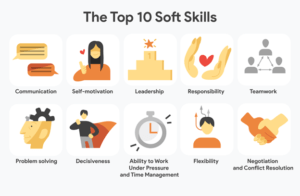In every organization, the mantle of leadership carries with it the duty of ensuring team members are well-equipped with essential skills to meet organizational goals. Among these, soft skills like communication, teamwork, and problem-solving stand out as vital for success. Yet, a common hurdle for many leaders is effectively teaching these skills. This essay aims to shed light on several practical approaches for leaders to instill soft skills in their teams.
First off, let’s demystify what soft skills are. They are a blend of personal traits, character qualities, and communication capabilities that facilitate effective and smooth interactions among individuals. Skills encompassing areas such as communication, problem-solving, time management, leadership, teamwork, and
adaptability fall under this umbrella. These skills, often labeled as “people skills” or “interpersonal skills,” are highly prized in the workplace.
There’s a wide array of soft skills crucial to the fabric of organizations, but a few stand out as particularly key:
Adaptability: Mastery of adaptability is essential; it’s the skill of seamlessly maneuvering through unexpected turns and shifts in the business landscape.
Leadership: Effective leadership is characterized by the ability to invigorate and influence a team, marked by clear vision, strategic insight, and the power to engender trust.
Emotional Intelligence: Profound emotional intelligence is vital, entailing acute awareness and control of one’s emotional state and the capacity to empathize with others, facilitating strong bonds and adeptness in navigating workplace tensions.
Interpersonal Skills: The capability to meaningfully connect and communicate with various individuals, including clients and colleagues, is crucial for nurturing a collaborative and affirmative organizational environment.

Time Management: The discipline of judiciously organizing and executing tasks to meet designated deadlines is integral to fulfilling objectives and optimizing efficiency.
Cultural Intelligence: An understanding and respect for cultural variances enhance an organization’s inclusivity and its ability to resonate with a diverse spectrum of customers and partners.
The significance of soft skills in the workplace is multifaceted, particularly due to their profound impact on employee collaboration and cooperation. In the dynamic and competitive milieu of contemporary business, the ability to work harmoniously with colleagues, clients, and customers is paramount for achieving collective objectives. Soft skills, encompassing abilities like effective communication, teamwork, and adept problem-solving, play a pivotal role in cultivating robust relationships and a constructive workplace atmosphere.
Furthermore, soft skills are intrinsically tied to employee performance and productivity. Individuals who excel in soft skills are often more capable of meeting job demands and achieving their targets, which can enhance job satisfaction and bolster employee engagement. A study by the Harvard Business Review underscores this point, revealing that employees who balance technical skills with soft skills are more likely to receive promotions and succeed in their roles. It highlighted that abilities such as communication, teamwork, and leadership are often stronger predictors of success than technical skills alone.
The evolving job market also underscores the growing importance of soft skills. With automation and technological advancements rendering many technical or routine jobs obsolete, the emphasis is shifting towards employees who possess strong soft skills. These individuals are valued for their adaptability and their ability to work effectively with others in a changing work landscape.
Lastly, soft skills are integral to nurturing a positive work culture and promoting employee well-being. When employees feel valued and respected, their engagement, motivation, and commitment to their work intensify. This sentiment is echoed by another study from McKinsey & Company, which found that companies emphasizing a culture rich in soft skills like communication, collaboration, and problem-solving tend to experience greater success and higher levels of employee engagement. Investing in developing these skills can lead to a more harmonious, productive, and successful workplace environment.
In addition, a research by the University of Cambridge Institute for Sustainability Leadership (CISL) which surveyed over 1,000 business leaders globally, has found that companies which prioritize soft skills such as emotional intelligence, creativity, critical thinking and problem-solving, are more likely to be successful in the long run.
Adopting soft skills, such as effective communication, teamwork, and problem-solving, can be challenging for employees for a variety of reasons. One of the main challenges is that these skills are often not taught or emphasized in traditional education or training programs. Many employees may not have had the opportunity to develop these skills during their education or early career, and may not know how to acquire them later on.
Another challenge is that soft skills are not always easy to measure or quantify. Unlike hard skills, such as proficiency in a particular software or technical expertise, soft skills are often more subjective and can be difficult to evaluate. This can make it difficult for managers to identify employees who may be in need of further development, and can make it hard to provide effective training and coaching.
Additionally, some employees may have difficulty recognizing the importance of soft skills in their work. They may view these skills as less relevant to their job or as less important than technical expertise. This can make it difficult to get employees to prioritize the development of these skills and to see the value in investing time and resources in their improvement.
Moreover, for some employees, adopting soft skills can be a difficult process because of their personality and personal traits. For example, employees who are introverted may find it challenging to communicate effectively with others or work in a team setting. Similarly, employees who have difficulty controlling their emotions may have trouble managing stress and staying calm under pressure.
Finally, employees may find it challenging to adopt soft skills because of the organization’s culture. If the organization does not value or prioritize the development of soft skills, employees may not see the importance of these skills and may not be motivated to improve. Additionally, if the organization lacks a supportive culture, employees may not feel comfortable practicing new skills or may not receive the necessary feedback and support to improve.

Initiating the process of teaching soft skills involves pinpointing the necessary skills within the organization. This may require a skills gap analysis to identify the team’s deficiencies. After pinpointing these skills, leaders can design a targeted training program. This program should be customized to the organization’s unique needs and presented in an engaging, interactive format.
Mentoring and coaching are effective methods for imparting soft skills. This approach entails working closely with team members to foster their skill development. It can take the form of individual sessions, group workshops, or even online courses. Leaders should offer constructive feedback and guidance, which can be integrated into regular performance evaluations, goal-setting exercises, and consistent check-ins.
Role-playing and simulatons are also valuable tools for teaching soft skills. These techniques provide a risk-free environment for team members to practice necessary skills. For instance, creating a simulated scenario of a challenging customer interaction allows team members to rehearse and refine their approach, learning from errors and enhancing their ability to manage similar real-life situations in the future.
Leaders can effectively impart soft skills by exemplifying the behaviors they wish to see in their team members. Recognized as role models within the organization, leaders have a significant influence on their teams, who often emulate the behaviors they observe. It’s crucial for leaders to practice what they preach, showcasing the soft skills they want their teams to adopt. For instance, if a leader aims to foster a collaborative spirit, they should actively participate in team-oriented activities, like group brainstorming sessions, thereby highlighting the value of teamwork. John Wooden aptly said, “The most powerful leadership tool you have is your own personal example.” This underscores the impact of a leader’s conduct on the team’s behavior and learning.
In the final phase, leaders can further reinforce soft skills by creating practical opportunities for their team members to apply these skills. This could involve a variety of approaches, such as on-the-job training, rotating jobs to expose individuals to different roles, or assembling cross-functional teams. These experiences allow team members to use and refine their soft skills in real-life scenarios, thereby boosting their confidence and proficiency. Such hands-on application is key in transforming learned skills into ingrained habits, essential for the team members’ success and growth in their respective roles.
To summarize, the instillation of soft skills is a vital leadership function. Leaders can promote these skills through various actionable steps: initiating a skills gap analysis to identify areas for development, providing mentorship and coaching for personalized growth, using role-playing and simulations for real-world problem-solving, leading by example with commendable behavior, and allowing ample practice opportunities. Employing these strategies, leaders can equip their teams with essential soft skills, aligning individual performance with the broader aims of the organization.










